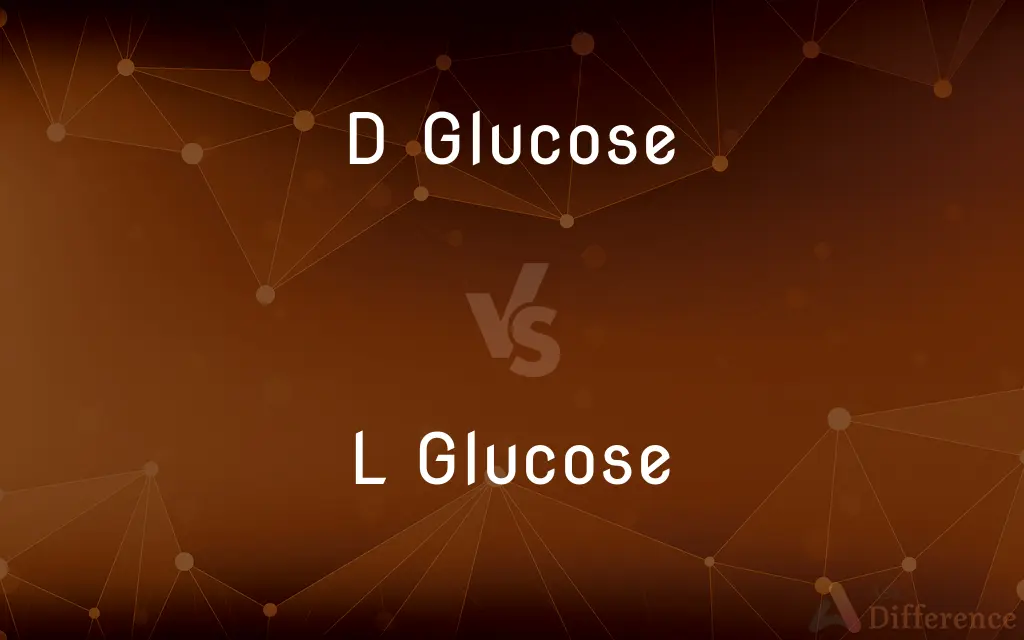D Glucose vs. L Glucose — What's the Difference?
Edited by Tayyaba Rehman — By Fiza Rafique — Published on October 16, 2023
D-Glucose and L-Glucose are stereoisomers of glucose, with D-Glucose being naturally occurring and metabolically active, while L-Glucose is its mirror image and not utilized by the body.

Difference Between D Glucose and L Glucose
Table of Contents
ADVERTISEMENT
Key Differences
While it might seem like a mere reflection wouldn't make much difference, in molecular biology, it does. L-Glucose isn't metabolized by the body in the same way. In fact, it's largely unutilized. If you think of enzymes as locks and sugars as keys, D-Glucose fits perfectly into our body's metabolic locks, but L-Glucose does not. It's a testament to how specific and precise biological systems are. The positioning of atoms and functional groups in these molecules determines their roles and functionalities in living systems.
Fiza Rafique
Oct 16, 2023
D-Glucose and L-Glucose are intriguing examples of how molecular structures can drastically influence function.
Fiza Rafique
Oct 16, 2023
D-Glucose, the most common form of glucose, is a simple sugar that serves as a primary energy source for many organisms. It's the primary form that's metabolized by our bodies. L-Glucose, on the other hand, is essentially the mirror image of D-Glucose.
Fiza Rafique
Oct 16, 2023
Comparison Chart
Metabolic Activity
Metabolically active in the body.
Not metabolized by the body.
Fiza Rafique
Oct 16, 2023
Natural Occurrence
Naturally occurring in most organisms.
Rarely found in nature.
Fiza Rafique
Oct 16, 2023
ADVERTISEMENT
Utilization
Used as an energy source by cells.
Not utilized as an energy source.
Fiza Rafique
Oct 16, 2023
Enzymatic Interaction
Fits into the body's enzymes for metabolism.
Doesn't fit well into the body's metabolic enzymes.
Fiza Rafique
Oct 16, 2023
Definitions
D Glucose
A primary energy source for many organisms.
The brain primarily relies on D-Glucose for energy.
Fiza Rafique
Oct 06, 2023
L Glucose
Can be synthesized in labs but is rare in nature.
L-Glucose has been explored as a sugar substitute because of its taste.
Fiza Rafique
Oct 06, 2023
ADVERTISEMENT
D Glucose
The naturally occurring form of glucose.
Most of the glucose found in our food is D-Glucose.
Fiza Rafique
Oct 06, 2023
L Glucose
A stereoisomer of D-Glucose.
The molecular structures of D-Glucose and L-Glucose are mirror images.
Fiza Rafique
Oct 06, 2023
D Glucose
A monosaccharide carbohydrate.
D-Glucose is one of the building blocks for larger carbohydrates.
Fiza Rafique
Oct 06, 2023
L Glucose
The non-natural mirror image of D-Glucose.
Though sweet, L-Glucose isn't used by our body for energy.
Fiza Rafique
Oct 06, 2023
D Glucose
Can be derived from dietary starches and sugars.
Consuming rice, a starchy food, increases D-Glucose in the bloodstream.
Fiza Rafique
Oct 06, 2023
L Glucose
Doesn't fit well into the body's metabolic enzymes.
Our enzymes aren't designed to metabolize L-Glucose.
Fiza Rafique
Oct 06, 2023
D Glucose
Metabolically active in the human body.
After eating, blood levels of D-Glucose rise, triggering insulin release.
Fiza Rafique
Oct 06, 2023
L Glucose
Not metabolically active in humans.
Consuming L-Glucose wouldn't raise your blood sugar levels.
Fiza Rafique
Oct 06, 2023
FAQs
Which form of glucose is found in our food?
D-Glucose is the naturally occurring form in most foods.
Fiza Rafique
Oct 16, 2023
What makes D-Glucose and L-Glucose different?
They're mirror images of each other, with D-Glucose being metabolically active and L-Glucose not.
Fiza Rafique
Oct 16, 2023
Why is D-Glucose important for the body?
D-Glucose is a primary energy source for cells, especially in the brain.
Fiza Rafique
Oct 16, 2023
Why don't our enzymes metabolize L-Glucose?
Enzymes are specific in structure, and L-Glucose doesn't fit well.
Fiza Rafique
Oct 16, 2023
Is D-Glucose the only form of glucose in nature?
While it's the predominant form, trace amounts of L-Glucose can be found.
Fiza Rafique
Oct 16, 2023
How are D-Glucose and L-Glucose related to chirality?
They're chiral isomers, with molecules that are non-superimposable mirror images.
Fiza Rafique
Oct 16, 2023
Can L-Glucose be used as a sweetener?
Yes, it's been explored as a sugar substitute because it tastes sweet but isn't metabolized.
Fiza Rafique
Oct 16, 2023
Can our body utilize L-Glucose?
No, L-Glucose isn't metabolized by the body for energy.
Fiza Rafique
Oct 16, 2023
Is L-Glucose harmful if consumed?
It's not harmful but also not utilized by the body for energy.
Fiza Rafique
Oct 16, 2023
Can animals metabolize L-Glucose?
Like humans, most animals can't efficiently metabolize L-Glucose.
Fiza Rafique
Oct 16, 2023
Where can L-Glucose be found?
L-Glucose can be synthesized in labs but is rare in nature.
Fiza Rafique
Oct 16, 2023
Why is D-Glucose crucial for the brain?
The brain primarily uses D-Glucose as its energy source.
Fiza Rafique
Oct 16, 2023
Are there other sugars with D and L forms?
Yes, many sugars have chiral forms, including D and L configurations.
Fiza Rafique
Oct 16, 2023
How does L-Glucose taste compared to D-Glucose?
Both taste sweet, but the body only utilizes D-Glucose for energy.
Fiza Rafique
Oct 16, 2023
How does the body respond to elevated D-Glucose levels?
It releases insulin to help cells absorb and use D-Glucose.
Fiza Rafique
Oct 16, 2023
Author Spotlight

Written by
Fiza RafiqueFiza Rafique is a skilled content editor at AskDifference.com, where she meticulously refines and enhances written pieces. Drawing from her vast editorial expertise, Fiza ensures clarity, accuracy, and precision in every article. Passionate about language, she continually seeks to elevate the quality of content for readers worldwide.

Edited by
Tayyaba RehmanTayyaba Rehman is a distinguished writer, currently serving as a primary contributor to askdifference.com. As a researcher in semantics and etymology, Tayyaba's passion for the complexity of languages and their distinctions has found a perfect home on the platform. Tayyaba delves into the intricacies of language, distinguishing between commonly confused words and phrases, thereby providing clarity for readers worldwide.

















































